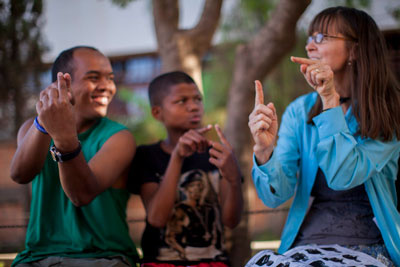The International Mission Board ranks deaf people as the fourth largest unreached people group on the planet, said Gospel Community Church pastor Danny Hinton. Statistically there are 7.5 million deaf people in the U.S., but only about 40 churches focus on trying to reach the deaf population.
“The numbers are staggering,” he said. “Officially we are reaching .0002 percent of the deaf population. Recent numbers say that 11,500 deaf people die every day without access to the gospel. That was our motivating push for planting a deaf church. Those plants are difficult and they’re hard to fund and there are issues with them, but with those staggering numbers we have the Great Commission right here in our back yard.
“If you look at special needs populations and handicapped populations, if you look at those individuals as unreached, that is the largest unreached people group on the planet, and they’re right here,” Hinton added. “There’s global missions right here!”
The deaf have disadvantages to spiritual growth. For instance, there is no complete translation of the Bible into American Sign Language. “Deaf folks can’t just get on YouTube and pull up a John Piper sermon and listen to it,” Hinton said, “so a lot are spiritually very young. What they do have is a lot of excitement and a lot of fire.

IMB photo
“Sprinkled in there are solid mission-minded people doing discipleship. We’ve got a couple that served as missionaries in Peru for several years—they’ve been on the mission field in the third world context, been in a cross-cultural, multilingual context.
“We’ve got a guy that served with ‘Reaching and Teaching’ in Brazil and South America. God has been really kind to us. We have three seasoned leaders who are mission-minded people.”
A typical service
Hinton said while there are some differences in how a deaf church structures services, “it’s really just church.”
But there are some notable differences, especially in the music.
“After interpreting larger venues with music, we understood that deaf people really enjoy music, especially the percussive ability to feel music. We have live music with drums and instruments of that nature.”
In most churches, the stage will feature a lead singer in the front, along with someone playing piano and guitar. In the back will be the bass player and drums. But for the deaf population, “the bass and drummer are the only ones they feel, so we bring those to the front. The singers are off to the side with the sign language interpreter in the middle.”
And for the first time for the deaf, they don’t have to sit in the front right corner. “They have access to sit wherever they want,” Hinton said. “When I preach, I preach and sign at the same time. That’s probably the most noticeable difference.” Deaf people don’t applaud by clapping. Instead, they applaud by raising their hands and twisting their wrists. Hinton said there is a slower pace in a deaf church. “You have to slow things down and pace things differently,” focusing on assuring everyone is fully included.
Diversity in the church
One reality Hinton noticed quickly is that people with deafness and disability “really don’t care about skin color or income level. I have had pastors ask how we have such diversity, saying they would welcome that diversity in their churches. We’ve really latched onto Revelation 7 that gathered before Christ that day will be an inheritance from every tongue, tribe, nation, language and people group. For us biblically we should make this church service look as much like that as possible.”
Involvement is immediate
“We’re definitely an oddball church. And I don’t think I’d have it any other way,” Hinton observed. “It’s bred in us a love for the diversity that God’s given us. Biblically we don’t see any precedent for individuals not getting their hands dirty really fast,” so GCC works quickly to find opportunities for new converts to be involved in the church’s ministries and activities.
“With special needs populations, many times they feel as if they can’t serve or they’re not allowed to serve. But giving meaningful places to serve for all of the members of the body of Gospel Community Church has given them a stake in the church and it’s given them ownership and collateral,” Hinton said.
One example is the food pantry ministry which feeds 15-17 families a month. Hinton oversaw that work initially, but then two people approached him and volunteered to run that ministry. “They said they would take it off my plate, and I haven’t touched it since, and they’ve done so much better with it than I ever could have,” Hinton said.
GCC ordained its first deacon last year—a man who is deaf, blind and has cerebral palsy. “We didn’t do it because it was the cool thing,” said Hinton. “He loves Jesus (1 Timothy 3, Titus 2)—and is a qualified individual who wants to serve the body of the church. He doesn’t make the greatest coffee in the world but he’s faithful to show up. He’s part of our set-up and tear down team on Sundays. He has volunteered in the food pantry.”
‘Small glimpse of the kingdom of heaven’
Pleasant Valley Community Church pastor Jamus Edwards applauds the vision and work of the church it planted.
“One of the great joys of PVCC has been to play a small role in coming alongside GCC,” said Edwards. “Danny Hinton is one of the most gifted, committed, faithful pastors that I know. His heart bleeds for Jesus and those that are far from God. GCC beautifully represents the Person and work of Jesus. When you step inside the fellowship of GCC, you get a small glimpse of the kingdom of heaven.”
GCC leadership includes pastoral candidate Kenny Flaspoehler and pastoral intern Luke Barnhard. At the time of this writing, GCC was in the process of interviewing worship leader candidates.
Chip Hutcheson